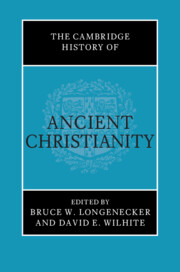Book contents
- The Cambridge History of Ancient Christianity
- The Cambridge History of Ancient Christianity
- Copyright page
- Contents
- Figures
- List of Contributors
- Editors’ Preface
- Part I Contested Contexts
- Part II Contested Figures
- Part III Contested Heritage
- Part IV Contested Cultures
- 14 Early Christians and Their Socioeconomic Contexts
- 15 Early Christians and Roman Imperial Ideology
- 16 Martyrdom between Fiction and Memory
- 17 The Emergence(s) of Christian Material Culture(s)
- 18 Manuscripts and the Making of the New Testament
- Part V Contested Beliefs
- Part VI Contested Bodies
- Ancient Sources
- Modern Authors
- References
18 - Manuscripts and the Making of the New Testament
from Part IV - Contested Cultures
Published online by Cambridge University Press: 23 August 2023
- The Cambridge History of Ancient Christianity
- The Cambridge History of Ancient Christianity
- Copyright page
- Contents
- Figures
- List of Contributors
- Editors’ Preface
- Part I Contested Contexts
- Part II Contested Figures
- Part III Contested Heritage
- Part IV Contested Cultures
- 14 Early Christians and Their Socioeconomic Contexts
- 15 Early Christians and Roman Imperial Ideology
- 16 Martyrdom between Fiction and Memory
- 17 The Emergence(s) of Christian Material Culture(s)
- 18 Manuscripts and the Making of the New Testament
- Part V Contested Beliefs
- Part VI Contested Bodies
- Ancient Sources
- Modern Authors
- References
Summary
The authors of ancient Christian literature all wrote their distinct stories about Jesus, their letters to churches, and other types of literature on manuscripts. Consequently, any serious study of ancient Christianity must take textual transmission into account.1 Since the New Testament books, in particular, became widely copied and read, the extant textual tradition is rich in comparison with other ancient works (a cause for optimism as to the recovery of the text).2 Today, no less than 6,014 manuscripts (141 papyri, 324 majuscules, 3,011 minuscules, and 2,538 lectionaries) have been assigned a Gregory-Aland number in the official registry of manuscripts maintained by the Institut für neutestamentliche Textforschung (INTF) in Münster.3 In addition, there are the early translations, in particular in Latin, Syriac, and Coptic, and the citations of Church Fathers to take into account.
- Type
- Chapter
- Information
- The Cambridge History of Ancient Christianity , pp. 419 - 442Publisher: Cambridge University PressPrint publication year: 2023

